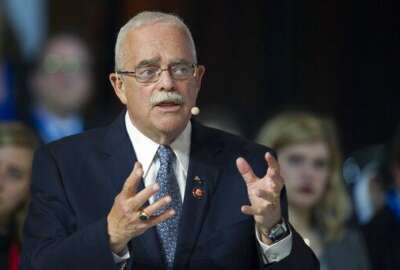House Republicans look to get feds back to the office
In today's Federal Newscast, some Republican lawmakers want to press pause on making remote work permanent.
To listen to the Federal Newscast on your phone or mobile device, subscribe in PodcastOne or Apple Podcasts. The best listening experience on desktop can be found using Chrome, Firefox or Safari.
- Some Republican lawmakers want to press pause on making remote work permanent. Rep. Yvette Herrell (R-N.M.) calls on agencies to give Congress a plan to address the adverse effects of remote work. The SHOW UP Act would require federal agencies to fully return to pre-pandemic telework policies, bringing employees back to the office. The bill also directs agencies to deliver studies to Congress on how pandemic-era telework impacted their quality of work. Herrell said expanded telework for federal workers continues to negatively affect agency missions.
- The Office of Personnel Management is calling on agencies to use all relevant skills when evaluating job candidates. Agencies should look at applicants’ skills from things learned in the classroom, on the job or even on their own. OPM’s new guidance details how agencies can step away from relying on education to consider applicants. Agencies have new advice from OPM on developing interview questions and using subject matter experts during hiring. The guidance lines up with a 2020 executive order on reforming the assessment of federal job candidates.
- House lawmakers are looking to ensure agencies are well trained on how to confront cyber attacks. The Homeland Security Committee approved a bill that would direct the Cybersecurity and Infrastructure Security Agency to establish training for securing industrial control systems. The committee also advanced legislation to reauthorize the Secret Service’s National Computer Forensics Institute. The Hoover, Alabama, facility is where law enforcement personnel, prosecutors and judges learn how to process computer evidence related to ransomware attacks and other cyber crimes.
- The Justice Department said good-faith cybersecurity research should not be charged under the Computer Fraud and Abuse Act. DOJ said the new policy will provide clarity for researchers who probe digital systems solely for the purpose of finding and correcting security flaws. The policy is likely welcome news for the federal cybersecurity community, which is increasingly turning to white-hat hackers through bug bounties and other vulnerability disclosure programs. And playoff hockey and basketball fans can also rest easy since DOJ clarified that checking sports scores on a work device, among other activities, is not a federal crime either.
- A bill giving new authority to the inspector general of the Department of Veterans Affairs now heads to President Joe Biden’s desk. The Strengthening Oversight for Veterans Act gave the VA IG the authority to subpoena testimony from former VA employees who have left federal service, former contractor personnel, or other individuals during its audits and investigations. IG offices across the federal government have asked Congress for this authority for years. Senate Veterans’ Affairs Committee Chairman Jon Tester (D-Mont.) introduced the bill with Sens. John Boozman (R-Ark.) and Joe Manchin (D-W.V.).
- A program analyst for the Department of Housing and Urban Development may have provided nonpublic HUD information to a private company. That’s the findings of a recent investigation from the agency’s inspector general. The IG said the GS-15 employee provided a HUD Budget Portfolio document not authorized for public release to a senior official of a private firm by email. The IG referred its findings to the Justice Department where no prosecution resulted.
- Hundreds of IRS employees wrongfully accessed taxpayer information over last 10 years. The Government Accountability Office found the IRS completed nearly 1,700 investigations of employees allegedly gaining willful unauthorized access to taxpayer information since 2012. The IRS determined employees violated the agency’s policies in 27% of cases. GAO found more than 82% of those violations resulted in an employee’s suspension, resignation or removal. The GAO report stems from a ProPublica report last year, in which the outlet claimed to have gained access to sensitive taxpayer information on wealthy individuals. (Federal News Network)
- A former Federal Bureau of Prisons correctional officer pled guilty to sexually abusing inmates. The Justice Department said 47-year-old Luis Curiel admitted to engaging in sexual acts with three inmates last year. The incidents happened at an administrative security federal prison for female inmates with specialized medical and mental health needs. Curiel now faces up to 30 years in federal prison. The Justice Department inspector general’s office conducted the investigation.
- Military commissaries are placing limits on baby formula purchases as the nation deals with a shortage. The Defense Commissary Agency said it is limiting the amount of formula a person can buy based on local and state Women, Infants and Children Program guidance. The agency said it currently has half of its usual stock levels in commissaries in the United States.
- Top senators said they have reached a deal to help millions of veterans exposed to toxic chemicals. Leaders of the Senate Veterans’ Affairs Committee said they have agreed on the framework for the most comprehensive toxic exposure legislation in American history. The plan would establish 23 illnesses and cancers as linked to military service in war zones with burn pits and other toxic waste disposal methods. The move would expand VA toxin-exposure care to more than 3.5 million veterans. The bill is expected to cost more than $200 billion over the next ten years.
- Two of the next great governmentwide multiple award contracts will not have contract ceiling threshold. The General Services Administration issued a deviation to the Federal Acquisition Regulations for the Polaris small business vehicle in March, removing the requirement to set a total dollar ceiling for how much agencies could order against it. GSA also plans to issue a similar deviation for the Services multiple award contract, which is currently under development. These deviations are likely in response to challenges GSA faced with the 8(a) STARS 2 vehicle that reached it ceiling before the end of the contract as well as concerns that the Alliant 2 contract will meet the same fate.
- Bipartisan support for new funding for IT modernization emerged in the Senate. A bipartisan group of Senators joined the industry-led bandwagon to convince the appropriations committees to fully fund the Technology Modernization Fund. Sens. Mark Warner (D-Virg.), Steve Daines (R-Mont.) and Thom Tillis (R-N.C.) sent a letter to Appropriation Committee leaders asking them to provide at least $300 million for the TMF, which would match the president’s request in the fiscal 2023 budget. The lawmakers said Congress has a responsibility to continue to fund modernization efforts so that legacy systems aren’t left to grow increasingly costly and insecure over time. The letter follows several similar pleas by industry associations over the last few weeks.
Copyright © 2024 Federal News Network. All rights reserved. This website is not intended for users located within the European Economic Area.
Eric White
Eric White is news anchor and Federal Drive producer at Federal News Network.
Follow @FEDERALNEWSCAST
Related Stories
OPM hiring policy gives agencies new tool to more easily recruit recent graduates
DOJ could start looking closer at cybersecurity fraud on government technology providers
Related Topics
All News
Bug Bounty
Bureau of Prisons
Congress
defense commissary agency
Department of Housing and Urban Development
Federal Drive
Federal Newscast
General Services Administration
Government Accountability Office
hazardous chemicals
House of Representatives
IRS
Justice Department
Management
New Mexico
Office of Personnel Management
remote work
SHOW UP Act
technology modernization fund
telework
Tom Temin
Workforce
Yvette Herrell






